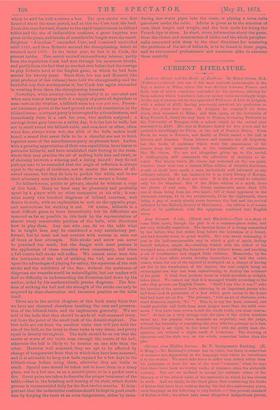Amy Stennett. 3 vols. (Hurst and Blackett.)—This is a story
of some little merit, though the plot is of a common-place order, and not very skilfully contrived. The heroine hears of a wrong committed by her father, who had stolen long before the invention of a friend, and had thereby risen to great wealth. She sets about redeeming it just in the half-unreasonable way in which a girl of spirit, feeling herself helpless, might do,—making friends with the widow of the wronged man, avoiding the luxuries of her father's house, and teaching a set of troublesome and ragged little children. Meanwhile, by the help of a love affair, events develop themselves ; at last the crisis comes, when the son of the injured is arraigned on a charge of having set fire to the warehouses of the injurer, the real culprit being an extravagant son who has been endeavouring to destroy the evidence of his guilt. A trial, that perilous scene in which novelists so delight, takes place. We cannot say that it is managed wholly according to the
rules that govern our English Courts. Shall I say who it was?" asks the heroine of the accused hero, referring to an important person who had been seen in possession of a key which gave access to the house that had been set on fire. The prisoner, "with an air of obstinate, awk- ward firmness, replied, 'No ' "! This is, to say the least, unusual, and would probably call forth from most judges more than the mild com- ment, "You have been sworn to tell the whole truth, you must remem- ber." At last, in a very strange way, the plan of the stolen machine turns up ; the popular voice demands an acquittal ; and the judge, without the formality of consulting the jury, tells the prisoner he is free. Everything is set right, in the usual way ; and the guilty man dis- appears, not without a slight smell of brimstone. The drawing of character and the style are, on the whole, somewhat better than the plot.


































 Previous page
Previous page